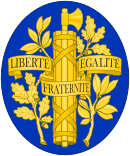2002 French legislative election
 | |||||||||||||||||||||||||||||||||||||||||||||||||||||||||||||||||||||||||||||||||||||
| |||||||||||||||||||||||||||||||||||||||||||||||||||||||||||||||||||||||||||||||||||||
All 577 seats in the French National Assembly 289 seats needed for a majority | |||||||||||||||||||||||||||||||||||||||||||||||||||||||||||||||||||||||||||||||||||||
|---|---|---|---|---|---|---|---|---|---|---|---|---|---|---|---|---|---|---|---|---|---|---|---|---|---|---|---|---|---|---|---|---|---|---|---|---|---|---|---|---|---|---|---|---|---|---|---|---|---|---|---|---|---|---|---|---|---|---|---|---|---|---|---|---|---|---|---|---|---|---|---|---|---|---|---|---|---|---|---|---|---|---|---|---|---|
| Turnout | 64.4% ( 4.5pp) (first round) 4.5pp) (first round)60.3% (  4.1pp) (second round) 4.1pp) (second round) | ||||||||||||||||||||||||||||||||||||||||||||||||||||||||||||||||||||||||||||||||||||
| |||||||||||||||||||||||||||||||||||||||||||||||||||||||||||||||||||||||||||||||||||||
 Colours denote the winning party, as shown in the main table of results. | |||||||||||||||||||||||||||||||||||||||||||||||||||||||||||||||||||||||||||||||||||||
| |||||||||||||||||||||||||||||||||||||||||||||||||||||||||||||||||||||||||||||||||||||
 |
|---|
|
|
| |
|
| Related topics |
|
|
Legislative elections were held in France on 9 and 16 June 2002,[1] to elect the 12th National Assembly of the Fifth Republic, in a context of political crisis.
The Socialist Prime Minister Lionel Jospin announced his political retirement after his elimination at the first round of the 2002 presidential elections. President Jacques Chirac was easily reelected, all the Republican parties having called to block far-right leader Jean-Marie Le Pen. Chirac's conservative supporters created the Union for the Presidential Majority (Union pour la majorité présidentielle or UMP) to prepare for the legislative elections.
The first round of the presidential election was a shock for the two main coalitions. The candidates of the parliamentary right obtained 32% of votes, and the candidates of the "Plural Left" only 27%. In the first polls, for the legislative elections, they were equal.
The UMP campaigned against "cohabitation", which is blamed for causing confusion profitable to the far-right and far-left. Jean-Pierre Raffarin, a relatively low-profile politician who said he would listen to "France at the bottom", was chosen as the party's candidate for Prime Minister.
Without a real leader, and staggered by the results of 21 April, the left was in difficulty. The Socialist chairman François Hollande tried to revive the "Plural Left" under the name of "United Left"; but the effort was undermined by the fact that it did not have a sufficiently concrete programme. Furthermore, the left-wing parties could not motivate their voters against an unrecognized and apparently uncontroversial politician like Raffarin. In addition part of the left-wing electorate did not want a new "cohabitation". Finally, the polls indicated a growing advantage for the Presidential Majority.
The right won the elections and the UMP obtained a large parliamentary majority of 394 seats. For the third time under the Fifth Republic, a party acquired an absolute majority (the "blue surge"). Five months later, it became the Union for a Popular Movement.
On the left, the Socialist Party achieved a better result than at the winning 1997 elections, but its allies were crushed. The far-left returned towards its usual level. In far-right, the National Front lost half of its 5 May voters.
Opinion polls

Results
 | ||||||||
|---|---|---|---|---|---|---|---|---|
| Party | First round | Second round | Total seats | |||||
| Votes | % | Seats | Votes | % | Seats | |||
| Union for a Popular Movement | 8,408,023 | 33.30 | 48 | 10,029,669 | 47.26 | 309 | 357 | |
| Socialist Party | 6,086,599 | 24.11 | 1 | 7,482,169 | 35.26 | 139 | 140 | |
| National Front | 2,862,960 | 11.34 | 0 | 393,205 | 1.85 | 0 | 0 | |
| Union for French Democracy | 1,226,462 | 4.86 | 6 | 832,785 | 3.92 | 23 | 29 | |
| French Communist Party | 1,216,178 | 4.82 | 0 | 690,807 | 3.26 | 21 | 21 | |
| The Greens | 1,138,222 | 4.51 | 0 | 677,933 | 3.19 | 3 | 3 | |
| Miscellaneous right | 921,973 | 3.65 | 3 | 274,374 | 1.29 | 5 | 8 | |
| Hunting, Fishing, Nature, Traditions | 422,448 | 1.67 | 0 | 0 | ||||
| Radical Party of the Left | 388,891 | 1.54 | 0 | 455,360 | 2.15 | 7 | 7 | |
| Revolutionary Communist League | 320,467 | 1.27 | 0 | 0 | ||||
| Lutte Ouvrière | 301,984 | 1.20 | 0 | 0 | ||||
| Republican Pole | 299,897 | 1.19 | 0 | 12,679 | 0.06 | 0 | 0 | |
| Ecologists | 295,899 | 1.17 | 0 | 0 | ||||
| National Republican Movement | 276,376 | 1.09 | 0 | 0 | ||||
| Miscellaneous left | 275,553 | 1.09 | 0 | 268,715 | 1.27 | 6 | 6 | |
| Movement for France | 202,831 | 0.80 | 1 | 1 | 1 | |||
| Miscellaneous | 194,946 | 0.77 | 0 | 13,036 | 0.06 | 1 | 1 | |
| Liberal Democracy | 104,767 | 0.41 | 1 | 1 | 2 | |||
| Rally for France | 94,222 | 0.37 | 0 | 61,605 | 0.29 | 2 | 2 | |
| Far-left | 81,558 | 0.32 | 0 | 0 | ||||
| Regionalists and separatists | 66,240 | 0.26 | 0 | 28,689 | 0.14 | 0 | 0 | |
| Far-right | 59,549 | 0.24 | 0 | 0 | ||||
| Total | 25,246,045 | 100.00 | 60 | 21,221,026 | 100.00 | 518 | 577 | |
| Valid votes | 25,246,045 | 95.67 | 21,221,026 | 95.65 | ||||
| Invalid/blank votes | 1,143,830 | 4.33 | 965,139 | 4.35 | ||||
| Total votes | 26,389,875 | 100.00 | 22,186,165 | 100.00 | ||||
| Registered voters/turnout | 40,968,484 | 64.42 | 36,783,746 | 60.32 | ||||
| Source: National Assembly | ||||||||
Parliamentary groups in the National Assembly
| Group | Members | |
|---|---|---|
| UMP Group | 364 | |
| Socialist Group | 149 | |
| UDF Group | 30 | |
| Communist Group | 22 | |
| Non-Inscrits | 12 | |
| Total | 577 | |
See also
References
- ^ "Elections held in 2002". Inter-Parliamentary Union.





















